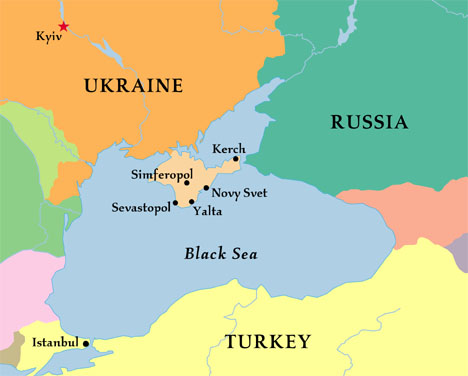President Putin’s Great Bluff: Using the past to understand why Russian aggression will end in Eastern Ukraine

By David Shimer
Because the vast majority of Crimean citizens who voted in the March 16 referendum wanted to join the Russian Federation, Moscow quickly annexed the region. It is ironic that the Russians are now proponents of democracy, given how they undemocratically governed Eastern Europe for more than forty years. Although Putin may attempt to take over additional territories in the ethnically Russian portions of Eastern Ukraine, recent history shows that concerns about potentially broader ambitions are mostly unfounded.
While the Soviet Union may have “allied” itself with Eastern Europe at the end of World War II, the relationship was unstable from its inception. Understanding the Soviet Union’s tenuous alliance with Eastern Europe, as well as Russia’s historic desire to be respected by the West, gives us insight into why Moscow chose to annex Crimea. Putin’s actions satisfy his nation’s long-standing feelings of territorial insecurity and enable Russia to reassert itself on the global stage. But the underlying menace of these actions represents a resurrection of the former Soviet Union’s willingness to “bluff” in pursuit of its broader goals.

First, let’s look at history in a way that has not been presented previously. For more than forty years (1945 – 1989), the “West” believed that the Soviet Union could, and might, invade Western Europe at any moment. The truth is that such an invasion was not possible, because the Soviets never had the true support of Eastern Europe. The factors that contributed to Eastern Bloc animosity toward the Soviets included:
- The brutal Soviet “liberation” of Eastern Europe at the end of World War II;
- The mass arrests of thousands of innocent Eastern Europeans in the late 1940s;
- The elimination of popular political parties;
- The suppression of deeply ingrained religious institutions; and
- Poor economic conditions driven by ineffective communist policies.
Not surprisingly, East Germany, Hungary and Poland all revolted against the Soviet Union by 1956, with Czechoslovakia following in 1968. A 1983 CIA report states that following these revolts the Soviets considered East Germany a “recent enemy” and Poland and Hungary “suspect allies.” The Soviets understood that these occupied nations could have used a Western European invasion as an ideal opportunity to rebel once again, not only robbing Moscow of millions of soldiers, but also crippling its supply lines. A report from the Office of Technology Assessment dated 1987 explains, “Questions have been raised as to whose side the East Europeans would fight on should hostilities begin.”
But why was the American government unaware of this reality during the 1950’s? While discussing the issue with former Ambassador and CIA operative Donald Gregg, he acknowledged, “The Agency missed most of the big calls on the Soviet Union during the early Cold War, the largely unexamined assumption being that the Warsaw Pact was far more monolithically loyal than it really was.” Similarly, former CIA Director Allen Dulles admitted to the National Security Council in 1953 that his Agency’s understanding of the Soviet Union was crippled by “shortcomings of a serious nature.” Consequently, the Soviets were able to present a united Eastern Bloc to the West. Their nuclear arsenal served as an overarching threat that further distracted focus from the Warsaw Pact’s fragile nature. Taken together, Soviet projections of global power forced CIA to prepare for war through operations such as “Gladio,” which planted underground forces in Western Europe in case of a Soviet invasion.
Since the end of the Cold War, ten former Warsaw Pact nations have joined NATO, the Soviet’s Cold War enemy. With rivals so close to its historic border, Russia’s territorial footprint is much less intimidating than it once was. Russians of Putin’s generation grew up under the illusion that the Soviet Union would indefinitely remain a true global power. Targeting Crimea allows for Putin to pander to Russians at home while also gaining control of a historically significant territory (both Peter and Catherine the Great fought for Crimea).
Unlike Eastern European nations, Crimeans prefer Russian annexation. On the ground reporter Carol Morello of The Washington Post related to me that factors like poor economic conditions led a majority of Crimea to support Putin, making Russian electoral intimidation unnecessary. But as the West speculates that the Russian bear has become restless and will seek to expand its footprint, it would be well served to remember the recent past, when the Soviets projected influence that they did not, in fact, entirely have.
Putin is the latest in a long line of Russian chess and poker masters – willing to bluff and intimidate to attain global standing and support at home. Apart from adjacent territories with Russian populations, Putin poses little threat to Eastern Europe. Whether it be during the Cold War or in the 21st century, these nations have never supported Russia in the way that Crimea does, which is why Russian aggression may continue, and certainly will end, in Eastern Ukraine.
David Shimer ’18 is an incoming freshman at Yale University.